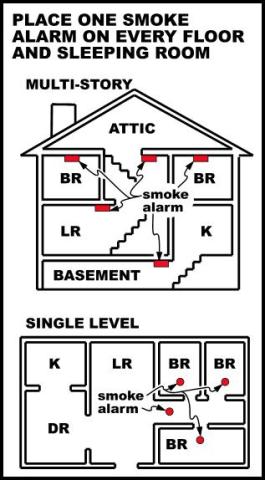About Maryland’s Smoke Alarm Law
A Maryland smoke alarm law that took effect on January 1, 2018 changed residential smoke alarm requirements. The law is designed to reduce fire-related injuries and deaths. Make sure your home is as safe as possible by coming into compliance.
LAW REQUIREMENTS NOW
- Replacement of battery-only smoke alarms with new, 10-year smoke alarms with sealed batteries and a "hush" feature (to silence the alarm temporarily during cooking).
- Replacement of hardwired devices more than 10 years old. Hardwired devices newer than 10 years still are acceptable.
- Hard-wired devices must be replaced with hard-wired devices. You cannot replace a hard-wired alarm with a battery-only alarm.
LAW REQUIREMENTS IN THE FUTURE
- The law requires replacement of all smoke alarms—hard-wired and battery-only—when they are 10 years old. That means 10 years from the date of manufacture printed on the back of the alarm. If you can't find a date, your smoke alarm needs to be replaced.
- Smoke alarms lose their operational sensitivity after 10 years.
- Hard-wired devices must be replaced with hard-wired devices.
ALARM BRANDS
- BCoFD does not endorse one manufacturer over another.
- Smoke alarms are available at most home supply stores, "big box" retail stores and at many online retailers.
- Alarms should comply with Underwriters Laboratory (UL) 217, "Standard for Safety for Single and Multiple Station Smoke Alarm."
RENTAL PROPERTIES
- The new law applies to rental properties.
- The new requirements do not impact individuals in the County’s rental registration program because the County’s rental registration provisions do not permit battery-operated smoke detector units and require hard-wired smoke detectors.
ENFORCEMENT
The local fire code does not grant right of entry into privately-owned single- and multi-family dwellings.
PURPOSE OF THE LAW

The law was designed to achieve the most reliable smoke alarm coverage possible in older dwellings without requiring homeowners to run new wiring. The law's overall purpose is reduction of fire deaths and injuries.
Studies of residential fire fatalities show that more than half of smoke alarms in these incidents failed to sound because the nine-volt battery had been removed. The sealed battery requirement eliminates that problem.
PLACEMENT OF SMOKE ALARMS
Smoke alarms should be placed on every level of the home and inside every bedroom.
Find additional information about installation and maintenance of smoke alarms.